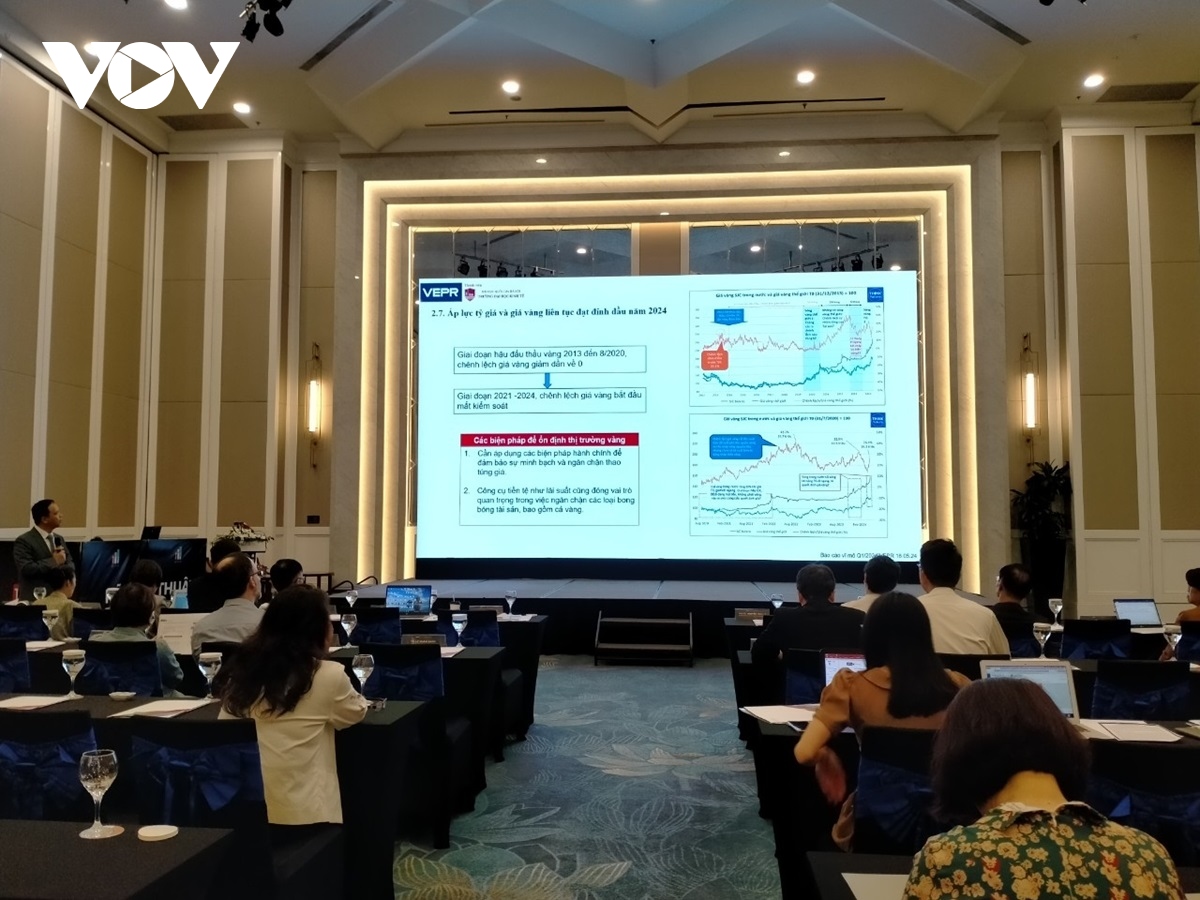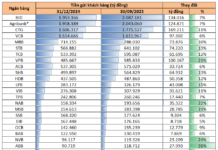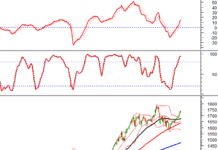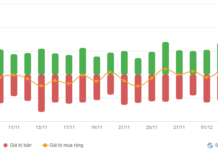On the morning of May 17, the Institute of Economics and Policy Research (VEPR), University of Economics, Vietnam National University, Hanoi, held a seminar on “Policy Dialogue: Stabilizing the Gold Market, Maintaining Macroeconomic Stability, and Promoting Recovery in an Uncertain Context.”
Assessing the global economic situation in the first quarter and the first four months of 2024, VEPR’s report shows that the global economy is expected to continue facing challenges, with a slower growth rate compared to 2023.

VEPR forecasts economic growth in 2024 to be around 6%, close to the lower bound of the target.
Regarding the Vietnamese economy in the first four months of 2024, Dr. Nguyen Quoc Viet, Vice President of VEPR, said that the economy is witnessing a recovery in import and export activities and foreign direct investment. Notably, Vietnam maintained a trade surplus for eight consecutive years, with export turnover reaching US$238.88 billion, up 15.2% over the same period last year, and the economy maintained a trade surplus of US$8.4 billion in the first four months.
Foreign direct investment (FDI) attraction in the first months was quite positive. The total registered capital of new investments, adjusted capital, and capital contribution and share purchases by foreign investors in the first four months reached nearly US$9.27 billion, up 4.5% over the same period last year. Especially, FDI realization in Vietnam in the first four months is estimated at US$6.28 billion, up 7.4% over the same period last year.
“This is the highest foreign direct investment realization in the first four months of the past five years. These figures show that FDI attraction is one of the bright spots contributing to the positive results of the economy in the first four months, creating a favorable start for 2024,” said Dr. Nguyen Quoc Viet.
In addition, the construction industry also showed signs of improvement, with a growth rate of 6.28%, contributing 41.68% to the increase in the total added value of the entire economy in the first quarter of 2024.
However, alongside the bright spots in exports and foreign investment attraction, there are still factors that make Vietnam’s economic recovery in 2024 not truly sustainable. Specifically: In the first quarter of 2024, total retail sales of goods and services revenue increased by 8.2% compared to the same period last year, but compared to the fourth quarter of 2023, there was a downward trend, although this was the period of the Lunar New Year holiday.
Along with this, enterprises are facing many difficulties, with the number of enterprises withdrawing from the market 1.5 times higher than the number of newly established enterprises. Especially, the registered capital of newly established enterprises tends to be smaller.
“It’s not just the difficulties from the external environment, but the internal capacity of Vietnamese enterprises has not improved, with their scale and lifespan decreasing. Poor competitiveness, difficulties in accessing capital and markets. These are alarming issues and will negatively affect the economy in the medium and long term, reflecting the lack of strong growth drivers. If this situation persists, there is a risk of recession,” said Dr. Nguyen Quoc Viet.
Also related to enterprise development, Prof. Dr. Hoang Van Cuong, a member of the National Assembly’s Finance and Budget Committee, said that whether the economy grows or not depends on the business sector. However, the situation of enterprises in the first four months of the year shows some abnormalities compared to previous years.
“Prices and interest rates are low, but many enterprises cannot meet the conditions to access loans, although the State Bank has extended Circular 02 on debt restructuring and rescheduling. This is a challenge for enterprises to recover,” said Prof. Dr. Hoang Van Cuong.
Along with that, the credit growth in the first four months of the year was the lowest in the past ten years, indicating a need for stronger measures to support businesses.
“Some risks to macroeconomic stability include pressure on exchange rates and gold prices, which have continuously hit new highs in early 2024. Although inflation is still under control and below the target threshold, it may increase in the coming time. In addition to asset bubbles and exchange rates, which can lead to changes in the interest rate landscape, cost-push inflation is a concern in the second half of 2024,” said Dr. Nguyen Quoc Viet.
Comparing the annual forecasts of international organizations with the domestic economic situation, VEPR cautiously forecasts economic growth in 2024 to be in the range of 5.5 – 6%.

Experts discuss at the seminar
VEPR experts also forecast that in 2024, the Vietnamese economy will continue to face some challenges, such as the delay in the Fed’s interest rate cut, which will reduce exports and foreign investment in Vietnam; geopolitical conflicts worldwide are complex and prolonged, affecting Vietnam’s imports and exports and production; businesses’ production and business activities still face many difficulties and challenges in terms of markets, human resources, technology, and capital; climate change, drought, floods, and saltwater intrusion are increasing, which will also affect the process of economic recovery and growth.
In addition, there is pressure on inflation due to the high inflation trend worldwide and the loose monetary policy in Vietnam. Moreover, costs in some sectors of imported goods and public services tend to increase.
To promote economic recovery and growth, VEPR suggests enhancing public investment disbursement, ensuring progress and focus, especially on important infrastructure projects, to create a solid foundation and improve the economy’s competitiveness.
“Prioritize policies and reforms to remove difficulties, reduce burdens on businesses, build trust in the investment environment, encourage businesses to return to the market and expand their scale. It is necessary to continue reducing the value-added tax (VAT) in 2024 and consider expanding the scope. Promote the diversification of capital channels and investment beyond bank credit and enhance the independence and autonomy of the Vietnamese economy and enterprises. Also, complete the national digital transformation strategy, promote the factors that create real economic value in the digital economy,” VEPR experts recommended.



































